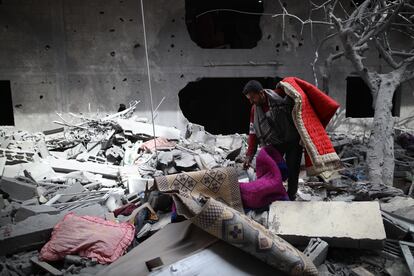At least 20 killed in new Israeli army raid on Al Shifa, Gaza’s largest hospital
Israel’s army arrested more than 80 people in what it called a ‘precise operation’ based on information that Hamas was using the medical compound

The Israeli army raided again the largest hospital in the Gaza Strip, Al Shifa, one of the few functioning medical centers left in the north of the Palestinian enclave. The Ministry of Health of the Hamas government informed Monday that there were several casualties and injuries, without specifying a number, but pointed out that the facility houses about 30,000 people, including thousands of forcibly displaced civilians, as well as patients and medical personnel. The Israeli army later reported that it had “eliminated 20 terrorists,” including Faiq Mabhuoch, whom it identified as responsible for Hamas internal security operations. The attack set off a fire in one of the hospital’s buildings. Israel described the raid as a “precise operation” based on “intelligence information indicating the use of the hospital by senior Hamas terrorists to conduct and promote terrorist activity.” More than 80 people were arrested and one Israeli soldier was killed.
The Israeli army claims to have taken control of the hospital, with armored vehicles and snipers. Shots were heard in the neighborhood and images of an Israeli tank at the main entrance of the complex were shared on social networks. The Israeli Defense Forces (IDF) released a clip of a video showing shots fired at their soldiers from hospital buildings. “The troops responded with live fire and hits were identified. Our troops are continuing to operate in the area of the hospital,” the IDF said in a statement.
The Israeli army dropped leaflets in Arabic over Rimal, the neighborhood in Gaza City where the hospital is located, warning civilians: “To all those who exist or are displaced in Rimal and the displaced in Al Shifa and its vicinity: you are in a dangerous combat zone. The IDF is operating hard in its residential areas to destroy terror infrastructure.” The statement also ordered people to head toward Al Mawasi, the area in the southern Gaza where Israel initially intended to direct the hundreds of thousands of displaced people from the north.
The IDF had already invaded Al Shifa last November, drawing widespread condemnation. In the end, the sick and displaced were evacuated and some of the medical staff arrested. Israel justified the operation on the grounds that the hospital was hiding a Hamas command and control center in a tunnel under the premises — something that it never found. Israel also claimed that laying siege to the hospital would allow its forces to rescue some of the more than 240 hostages that remained in Gaza at the time, but it also did not find any of them there.
Negotiations in Qatar
On Sunday, Israeli Prime Minister Benjamin Netanyahu made clear his determination to invade Rafah, in the south of the Gaza Strip, the only area Israeli troops have not stormed by land and where more than one million forcibly displaced persons are concentrated. “Those who say that the action in Rafah will not occur are those who also said that we would not enter Gaza, or act in [Al] Shifa [hospital] or in Khan Younis, and that we would not resume the fighting after the pause [in hostilities in November],” he said.
In the interview with Fox, he went further, comparing the calls to end the war in Gaza to the situation in World War II: “That’s like leaving a quarter of the Nazi terrorist army in Germany and saying ‘No, we’re not going to finish the last quarter. And we’re not going into Berlin.’”
The assault on Al Shifa began in the early hours of the morning, hours before an Israeli delegation was due to leave for Qatar to take part in negotiations for a second ceasefire deal. Leading the delegation will be Mossad chief David Barnea, who will meet later in the day with Qatari Prime Minister Mohammed bin Abdulrahman, according to Agence France-Presse. The Israeli government on Sunday gave the delegation a “broad mandate” to reach the agreement, but also set the “red lines” that must not be crossed, according to official sources quoted by local media.
Sign up for our weekly newsletter to get more English-language news coverage from EL PAÍS USA Edition
Tu suscripción se está usando en otro dispositivo
¿Quieres añadir otro usuario a tu suscripción?
Si continúas leyendo en este dispositivo, no se podrá leer en el otro.
FlechaTu suscripción se está usando en otro dispositivo y solo puedes acceder a EL PAÍS desde un dispositivo a la vez.
Si quieres compartir tu cuenta, cambia tu suscripción a la modalidad Premium, así podrás añadir otro usuario. Cada uno accederá con su propia cuenta de email, lo que os permitirá personalizar vuestra experiencia en EL PAÍS.
¿Tienes una suscripción de empresa? Accede aquí para contratar más cuentas.
En el caso de no saber quién está usando tu cuenta, te recomendamos cambiar tu contraseña aquí.
Si decides continuar compartiendo tu cuenta, este mensaje se mostrará en tu dispositivo y en el de la otra persona que está usando tu cuenta de forma indefinida, afectando a tu experiencia de lectura. Puedes consultar aquí los términos y condiciones de la suscripción digital.









































